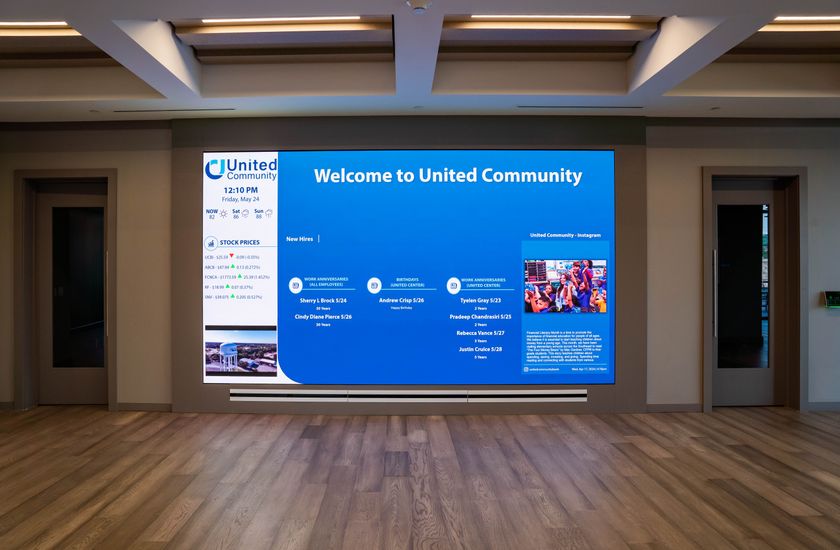Now Is Not the Time to Wait and See Is There A Reasonable Response To All This Uncertainty?
If you are reading this issue from the fetal position under your desk, then be forewarned — we’re going to talk about the economic crisis. As of this writing, only a small percentage of AV companies are feeling the direct effects of a downturn (see sidebar: Market Snapshot). For the majority, the remainder of 2008 looks good — even in the face of so much bad news. This means you have some time remaining to be proactive before the downturn reaches your doorstep. Consider a hurricane analogy: You may ride out the initial storm safely, but the real devastation is the prolonged loss of services. Without power there are no fresh groceries, limited medical, and no job to go to. Even if the power comes back on in your neighborhood, other sectors continue to do without. Your capacity to do business might exceed the number of customers that have the resources to use your services.
this economic downturn has been predicted for a long, long time. It was just waiting for a trigger, and we found one in the financial sector — one that had been predicted for even longer. Recession — if there will indeed be one — will run its course. I keep hearing folks say, “We’re not seeing the downturn yet, but the more folks talk about it the more tentative buyers become.” Because I know you have been more careful since 2001’s downturn, I expect you are already prepared to weather the storm and its aftermath. Just in case, let’s review:
Buy A Generator
When a hurricane threatens, the local hardware store is swamped with customers seeking plywood and generators. I often wonder what these folks did after the last storm? You guessed it; they threw away the plywood and sold the generator to make space in the garage. The analogy for our purposes is to get to Home Depot first: If your company diversifies now, it may be able to capture market share with new services. The alternative is to reduce services and focus on being more profitable in a limited capacity. In an all-out depression, you might consider stripping away everything that is not part of your most profitable core business. In my opinion, diversification is the better response in a downturn or even a recession.
Should you choose to diversify, what might you do? One obvious capability that will become a key player for meetings is webcasting and videoconferencing. Call it a virtual conference, but live and stored webcasts just became a viable solution to offset travel costs, time, and the appearance of fiscal responsibility. This was the much talked about solution after 2001, but it has taken several years to refine the technology into something practical and reliable. Another engine that I have touted before is content production. One stop shopping has a better chance of representing improved value to your customer — if you account for the time it might save the buyer to deal with only one supplier. This means you might be hiring a graphics person or video producer at a time when business is uncertain. But remember — you are hedging for the future.
Clean Up The Yard
Hurricane veterans know that it’s not just the winds that do the damage — it’s the flying debris. A dead tree in the yard could end up crashing into your home. In business terms these distractions show up in a variety of ways: problem employees, overdue personnel reviews, unfinished projects, maintenance backlogs, or the business plan you keep intending to work on. Don’t overreact to the suggestion that this may be a good time to let some marginal employees move on. This is something you should always be thinking about — not just when a storm is coming.
What I really hope to instill is the willingness to let failed initiatives die. If you’ve tried to get a project going twice and have not finished — cancel it. It clearly wasn’t important enough and it will be just one more gnawing issue when you should be focused on maximizing existing revenues or expanding services. As for business plans — if you are not doing them annually, then you are exceptionally unprepared for a downturn. A plan coalesces your ideas into a shareable document. Your team (and probably your banker) needs to know that you have an idea about how to move forward. Your employees also need to know what not to do. If it’s not in the plan, then maybe they shouldn’t be using company resources on it?
Stockpile
Another kind of contingency planning I learned from my Depression-era parents and grandparents: Stockpile supplies when you have the cash so you can always eat even when times are tough. This meant cabinets full of canned and dry goods (often purchased before clothing, Christmas gifts, or rent). For stagers, this might mean stocking up on cable, expendables, and other non-capitalized accessories funded by this year’s cash flow. This will help keep morale up, because there is nothing more depressing than hearing there’s not enough money to pay for essential items like gaff tape. I also recommend stocking up now on raw cable and connectors so that staff can perform useful work when times are slow. Buying now means reducing your profit in the remaining months of 2008, but it might mean that you keep costs down in 2009.
In the AV staging business, the difference between a good and bad month can be one show. What would it be worth to close one extra job each month? If there is less business to go around, don’t you think more of it will go to the companies that are better prepared to meet their customer’s needs? Consider bringing some industry- specific training to your sales team. The Stimson Group has a staging sales seminar that focuses on meeting the needs of the various customer types we encounter in our industry. There are other ways to invest in the future, such as conferences and manufacturer training. The Rental & Staging Roadshow is a great way to recharge team members. Don’t scrimp on other networking activities either. Renew all your association memberships for next year and make sure you take full advantage of that opportunity.










